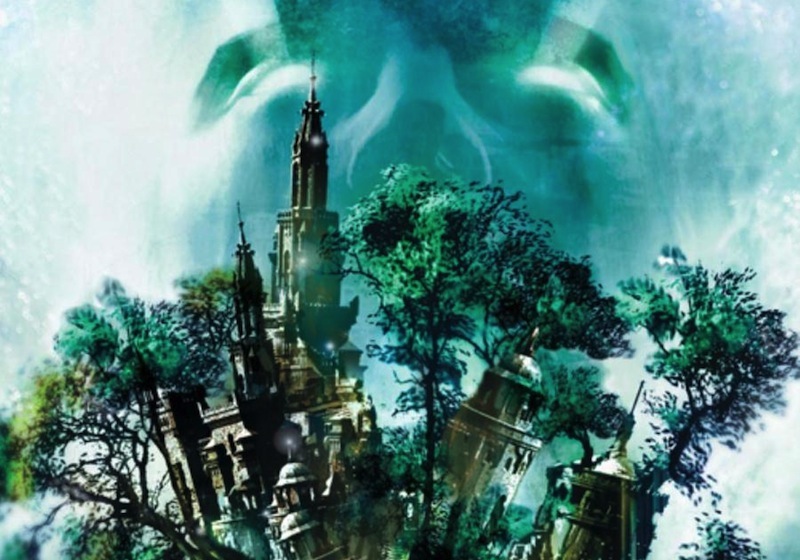As someone who doesn’t believe in gods, I must sheepishly confess that I find them fascinating. I think it’s because, in my own way, I consider myself a person of faith—it’s just that my faith, the thing that gives me comfort and joy in this world, is the belief that there are no gods. And it is absolutely a belief, straight up. I’m not a rationalist. I’d much rather flop around in the subjective, and that’s what I look for as both writer and reader. I’ll show you my world (through Rachel-coloured goggles), and you show me yours.
I like gods in fantasy, but even more than that, I like characters who struggle with belief and with proximity to the divine. It’s a struggle I’m familiar with, godless though I am, and one of the most stubbornly human things we do. Here, then, are five books that dig into the theological in a way I’ve enjoyed. Are they the best ever? I’m going to say yes. Subjectively, of course.
Raphael, by R.A. MacAvoy
 I will give the slightest of disclaimers here: I read this when I was twelve. So, thirty years ago. I’m sort of scared to pick it up again, because the books that shine incandescently when you’re that age and leave a permanent after-image on your brain don’t always hold up when you’re an adult. I’m including this, though, as a sentimental favourite. I grew up in the Bible Belt, and this was my first exposure to the idea that maybe it was okay to transform immutable holiness into interesting stories. The archangel Raphael, condemned to live on earth as a human, falls in love with a Berber woman. I found it deeply moving, at twelve. You’re allowed to report back that it’s not.
I will give the slightest of disclaimers here: I read this when I was twelve. So, thirty years ago. I’m sort of scared to pick it up again, because the books that shine incandescently when you’re that age and leave a permanent after-image on your brain don’t always hold up when you’re an adult. I’m including this, though, as a sentimental favourite. I grew up in the Bible Belt, and this was my first exposure to the idea that maybe it was okay to transform immutable holiness into interesting stories. The archangel Raphael, condemned to live on earth as a human, falls in love with a Berber woman. I found it deeply moving, at twelve. You’re allowed to report back that it’s not.
Throne of the Crescent Moon, by Saladin Ahmed
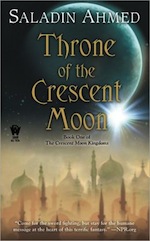 Oh, I love this so hard. It’s an Arabic-flavoured world, where people practice a monotheism (although is it literally Islam? There’s no mention of the Prophet, for example. This is something I’d love to hear Ahmed’s thoughts upon, if I ever have the chance). There are ancient, dead gods, perhaps corresponding to the Egyptian gods. What I appreciate most, however, is the glorious variety in how the characters approach their faith. Pragmatic, mystical, rigid, flexible—this book comes at belief from all angles. Even a monotheistic faith is not a monolith.
Oh, I love this so hard. It’s an Arabic-flavoured world, where people practice a monotheism (although is it literally Islam? There’s no mention of the Prophet, for example. This is something I’d love to hear Ahmed’s thoughts upon, if I ever have the chance). There are ancient, dead gods, perhaps corresponding to the Egyptian gods. What I appreciate most, however, is the glorious variety in how the characters approach their faith. Pragmatic, mystical, rigid, flexible—this book comes at belief from all angles. Even a monotheistic faith is not a monolith.
The Broken Kingdoms, by N. K. Jemison
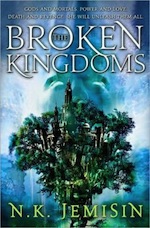 Gods everywhere! The gods here remind me of the ancient Greek pantheon, how they simultaneously transcend humankind and are the basest, crassest of jerks (I’m going to write a paper someday for the Journal of Crackpot Classical Theory, explaining how the assholery of the gods drove the ancient Greeks to create great art and philosophy, just so they could flip their gods the bird, but I digress). These are the best of deities and the worst of deities, and humans had really better stay out of the way. Faith, under such circumstances, is literally your relationship with your god. But can a human and a god be friends? One god, to his eternal chagrin, had better pray the answer is yes.
Gods everywhere! The gods here remind me of the ancient Greek pantheon, how they simultaneously transcend humankind and are the basest, crassest of jerks (I’m going to write a paper someday for the Journal of Crackpot Classical Theory, explaining how the assholery of the gods drove the ancient Greeks to create great art and philosophy, just so they could flip their gods the bird, but I digress). These are the best of deities and the worst of deities, and humans had really better stay out of the way. Faith, under such circumstances, is literally your relationship with your god. But can a human and a god be friends? One god, to his eternal chagrin, had better pray the answer is yes.
Feet of Clay, by Terry Pratchett
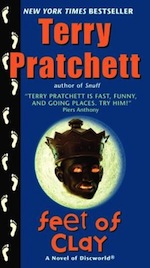 Have you ever lamented the dearth of atheists in fantasy? How can anyone be an atheist in a world where the gods are literally real? Well, my child, let Uncle Terry show you the way. Many of Pratchett’s books are meditations on the nature of belief—Small Gods comes to mind—but this is the best depiction I’ve seen of a mystical conversion to atheism, a sign from god (as it were) that there are, in fact, no gods.
Have you ever lamented the dearth of atheists in fantasy? How can anyone be an atheist in a world where the gods are literally real? Well, my child, let Uncle Terry show you the way. Many of Pratchett’s books are meditations on the nature of belief—Small Gods comes to mind—but this is the best depiction I’ve seen of a mystical conversion to atheism, a sign from god (as it were) that there are, in fact, no gods.
The Curse of Chalion, by Lois McMaster Bujold
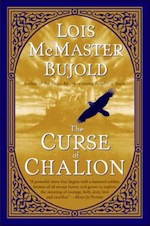 This is the queen mother of theological fantasy. Bujold has created a pantheon of gods and a theological system that make so much intuitive sense that I could totally believe in all of it, if I wasn’t already satisfied with my own beliefs. People are the only way the gods can interact with matter; free will is our ability to tell them no. To this I can only say, YES, PLEASE.
This is the queen mother of theological fantasy. Bujold has created a pantheon of gods and a theological system that make so much intuitive sense that I could totally believe in all of it, if I wasn’t already satisfied with my own beliefs. People are the only way the gods can interact with matter; free will is our ability to tell them no. To this I can only say, YES, PLEASE.
Honourable mention: Nation, by Terry Pratchett
It didn’t seem quite fair to put two Pratchett books on the list, and besides, this one really has no gods in it. This is the atheistic fantasy novel I wish I’d written, that perfectly captures the flavour—both ecstatic and bittersweet—of my own experience.
As a child, Rachel Hartman played cello, lip-synched Mozart operas with her sisters, and fostered the deep love of music that inspired much of her award-winning children’s novel, Seraphina. Its sequel, Shadow Scale, is available March 10th from Random House.










